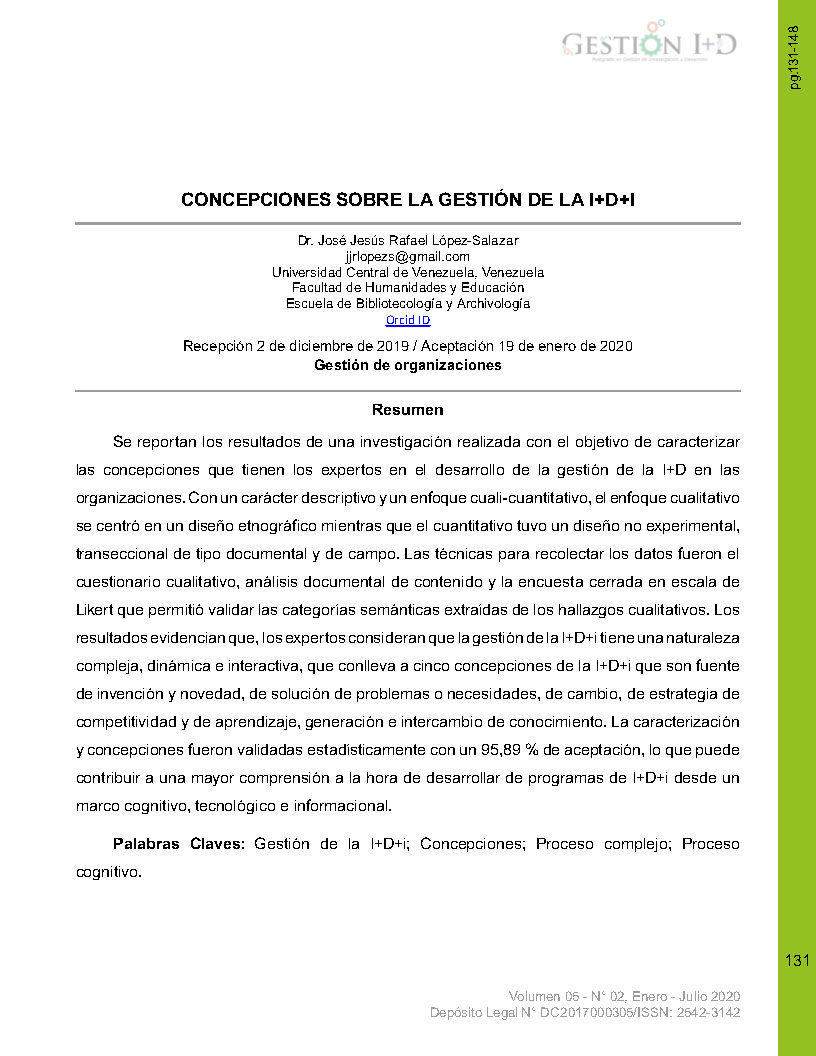R&D+i management conceptions
Keywords:
R&D Management, Conceptions, Complex process, Cognitive processAbstract
The results of an investigation carried out to characterize the conceptions that experts have for the development of R&D management in organizations are herein reported. Descriptive in nature and using a quali-quantitative approach, the qualitative aspects focused on an ethnographic design while the quantitative ones were approached through a non-experimental, cross-sectional documentary, and field design. The techniques used to collect the data were a qualitative questionnaire, a documentary content analysis, and a closed Likert scale survey to validate the semantic categories extracted. The results show that experts consider R &D + i management to be a complex, dynamic and interactive process that entails five conceptions of R &D + I, i.e., it is a source of invention and novelty, of solving problems or needs, of change, of strategies for competitiveness, and for learning, generating and exchanging knowledge. The characterizations and conceptions were statistically valid (95,89 %), which may contribute to a greater understanding when developing R &D + i programs from a cognitive, technological, and informational framework
Downloads
References
AENOR (2014). Gestión de la I+D+I. UNE 166002. Madrid: AENOR.
Aponte, G. M. (2015). El proceso de gestión de innovación tecnológica: sus etapas e indicadores relacionados. Revista Venezolana de Análisis de Coyuntura, 21 (1): 59-90. Disponible en: https://www.redalyc.org/pdf/364/36442240004.pdf
Aponte, G. M. (2016). Gestión de la innovación tecnológica mediante el análisis de la información de patentes. Negotium: Revista Científica Electrónica de Ciencias Gerenciales. 33:42-68. Disponible en: www.revistanegotium.org.ve
Barón, L. y Zapata R. G. J. (2017). Los sesgos cognitivos: de la psicología cognitiva a la perspectiva cognitiva de la organización y su relación con los procesos de toma de decisiones gerenciales. Ciencia y Sociedad, 43 (1) : 31-48. Disponible en: https://dialnet.unirioja.es › descarga › articulo
Cohen, M. y Levinthal, D. (1990). Absorptive Capacity: A New Perspective on Learning and Innovation. Administrative Science Quarterly. 35 (1): 128-152
Dodgson, M. (1991). Technology Learning, Technology Strategy and Competitive Pressures. British Journal of Management, 2 (3): 126-171. Disponible en : https://doi.org/10.1111/j.1467-8551.1991.tb00022.x
Dosi, G. (1982) Technological Paradigm and Technological Trajectories: A Suggested Interpretation of the Determinants and Directions of Technological Change. Research Policy, 22: 102-103. http://dx.doi.org/10.1016/0048-7333(82)90016-6
Edquist, Ch. Ed. (1997). Systems of innovation: Thecnologies, institutions and Organization. London and New York: Routledge Taylor & Francis Group. Disponible en : https://charlesedquist.files.wordpress.com/2015/06/science-technology-and-the-international-political-economy-series-charles-edquist-systems-of-innovation_-technologies-institutions-and-organizations-routledge-1997.pdf
González, S. (s/f). Innovación como fuente de desarrollo Escrito. Disponible en: https://www.mintic.gov.co/portal/604/articles-6308_recurso_1.pdf
Hernández S, R, Fernández C. y Baptista P. L (2007). Metodología de la investigación. México: MacGraw Hill.
Hidalgo, A., & Albors, J. (2008). Innovation Management Techniques and Tools: A Review from Theory and Practice. R&D Management, 38: 113-127.
http://dx.doi.org/10.1111/j.1467-9310.2008.00503.x
López, G. A. (2004). La innovación: un proceso socialmente distribuido. Scientia et Technica 10 (25): 197-2006. Disponible en: https://revistas.utp.edu.co/index.php/revistaciencia/article/view/7253/4287
López, J. J.R. (2019). Alfabetización informacional para la gestión de la I+D+i en las organizaciones. (Tesis doctoral) Universidad Central de Venezuela.
Mathison, L, J. Gándara, C. Primera y L. García (2007). Innovación: factor clave para lograr ventajas competitivas. Revista NEGOTIUM/ Ciencias Gerenciales. 3 (7): 46-83. Disponible en: https://www.redalyc.org/html/782/78230705/
Miller, W. L. (2015). The Generations of R&D and Innovation Management. in: Wiley Encyclopedia of Management Online. Disponible en: https://sci-hub.tw/ https://doi.org/10.1002/9781118785317.weom130021.
Nagles G., N. (2007). La gestión del conocimiento como fuente de innovación. Revista Escuela De Administración De Negocios, 61 : 97-102. Disponible en: https://journal.universidadean.edu.co/index.php/Revista/article/view/418
Nobelius, D. (2004). Towards the sixth generation of R&D management. International Journal of Project Management, 22 : 369–375. Disponible en: https://sci-hub.tw/https://doi.org/10.1016/j.ijproman.2003.10.002
Nooteboom, B. (2009). A Cognitive Theory of the Firm: Learning, Governance and Dynamic Capabilities. Cheltenham ; Northampton, Massachusetts Edward Elgar Pub
OCDE (2006). Manual de Oslo: Guía para la recogida e interpretación de datos sobre la innovación. 3era ed. España: Tragsa. Disponible en:
Patel, P. y Pavitt, K. (1994) National Innovation Systems: Why They Are Important, and How They Might Be Measured and Compared. Economics of Innovation and New Technology, 3, 77-95. Disponible en: https://doi.org/10.1080/10438599400000004
Pavitt, K (2003). The Process of Innovation (Paper No. 89). Science and Technology Policy Research SPRU, University of Sussex, Brighton
Pavón, J. e Hidalgo, A. (1997). Gestión e Innovación, un Enfoque Estratégico. Madrid, Ediciones Pirámide. Pp. 63-84.
Popadiuk, S., y Choo, C. W. (2006). Innovation and Knowledge Creation: How Are These Concepts Related. International Journal of Information Management, 26, 302-312.
Rincón C, E. (2004). El sistema nacional de innovación: Un análisis teórico-conceptual. Revista de Ciencias Humanas y Sociales, 20 (45). Disponible en : http://www.scielo.org.ve/scielo.php?script=sci_arttext&pid=S1012-15872004000300007
Robayo A., P. V. (2016). La innovación como proceso y su gestión en la organización: una aplicación para el sector gráfico colombiano. Suma de Negocios 36: 1-16. Disponible en: http://www.elsevier.es/es-revista-suma-negocios-208-resumen-la-innovacion-como-proceso-su-S2215910X1600015X
Rothwell, R (1994). "Towards the Fifth‐generation Innovation Process", International Marketing Review, 11 (1): 7-31, Disponible en: https://doi.org/10.1108/02651339410057491
Roussel, P.A., Saad, K.N., Erickson, T.J. (1991). Third generation R&D: managing the link to corporate strategy. Harvard Business School Press, Boston, Mass. [v.c. (1991) Tercera generación de I+D: su integración en la estrategia de negocio, McGraw-Hill, Madrid].
Usselman, S. W. (2013). Research and Development in the United States since 1900: An Interpretive History. Tesis doctoral presentada ante la Yale University. Disponible en: https://economics.yale.edu/sites/default/files/usselman_paper.pdf
Ziviani, F. (2012). A dinâmica de conhecimento e inovação no setor elétrico brasileiro: proposta de um conjunto de indicadores gerenciais. (UFMG, 14 de Dezembro, 2012). Tese doctorado en la Universidades Federal Minas Generais. Disponible en: http://www.bibliotecadigital.ufmg.br/dspace/bitstream/handle/1843/ECID-943NRJ/fabricio___tese_final_ultima_vers_o_revis_o_final.pdf?sequence=1



